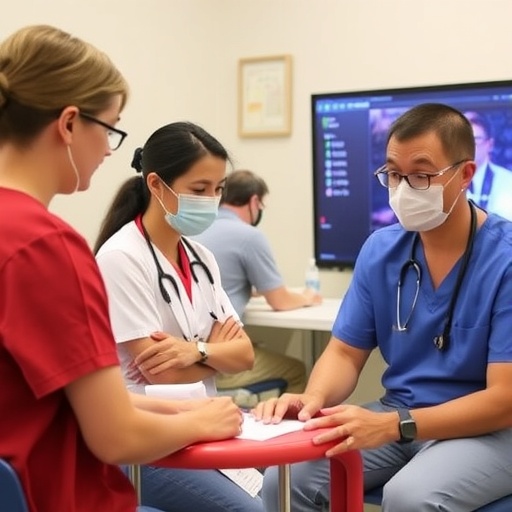As we veer into the complex world of medical education, recent findings reveal compelling methods to elevate the clinical thinking abilities of medical residents. With healthcare continually advancing, the imperative for effective training is undeniable, thus paving the way for cutting-edge techniques. One notable study, conducted by experts Meng, Wang, Jin, and their team, delves into the efficacy of situational simulation teaching as a means to enhance cognitive abilities in clinical settings.
Situational simulation teaching has emerged as a revolutionary approach in medical training, bridging the gap between theoretical knowledge and practical application. By immersing residents in lifelike scenarios, medical professionals are subtly ushered into a world that replicates the intensity and nuance of real patient interactions. The objective is not mere rote learning but fostering an environment where critical thinking and quick decision-making are honed.
Research highlights that traditional teaching methods often fail to adequately prepare residents for the unpredictability of clinical practice. In a standard educational landscape, information is frequently presented in a linear fashion—textbooks and lectures—with limited opportunities for experiential learning. Such methods can inadvertently lead to a disconnection between knowledge and practice, leaving residents feeling unprepared when they encounter real-life situations. Situational simulations, however, dismantle these barriers, allowing medical professionals to engage in dynamic problem-solving.
During the study, participants interacted in simulated environments where they were faced with common clinical dilemmas, receiving immediate feedback from trained facilitators. This immediate response mechanism plays a critical role in reinforcing learning. Residents grasp not only the ‘what’ of diagnosis but also the ‘why’ behind critical clinical decisions. Such interactions foster a deeper understanding of patient care that transcends textbook scenarios—a fundamental shift towards a more hands-on education model.
Moreover, the psychological aspect of learning in these simulations cannot be understated. Medical professionals often experience a spectrum of emotions in clinical settings—from stress to excitement. Situational simulations allow residents to navigate these emotional waters in a safe, controlled environment. By experiencing and managing their emotions in response to realistic situations, they cultivate resilience, an important quality for any healthcare provider.
The implications for patient care are profound. When residents are trained effectively through situational simulations, they not only enhance their clinical reasoning skills but also improve patient outcomes. A study conducted by the same team demonstrated that residents who had engaged in situational simulation reported greater confidence in their clinical abilities. This confidence translates into superior patient interactions, which may boost satisfaction and adherence to treatment plans.
Interestingly, one of the strengths of situational simulation teaching is the peer-learning aspect it facilitates. Participants often collaborate in pairs or small groups, simulating team-based care, which is a cornerstone of modern medicine. By working together, residents learn vital interpersonal skills such as communication, empathy, and collaboration. This cooperative learning not only reinforces the importance of teamwork in healthcare but also mimics the realities of a clinical setting where multidisciplinary cooperation is essential.
The study found that the benefits of situational simulation extend beyond clinical reasoning and emotional resilience—it also acts as a catalyst for self-assessment. Residents consistently reflected on their performance, identifying areas for improvement and adjusting their approach accordingly. This metacognitive process fosters a growth mindset, encouraging continuous learning and adaptation in a field that is perpetually evolving.
With the outcomes of this study emphasizing the transformative potential of situational simulation teaching, it raises important questions about the future trajectory of medical education. As educators consider integrating these methods into curricula, it is crucial to address resource allocation, faculty training, and logistical considerations in implementing such innovative teaching methods.
Ultimately, medical education must evolve just as the field of medicine evolves. The incorporation of situational simulations may serve as a model for rethinking curricula to foster not only knowledge acquisition but also the development of essential skills that healthcare providers need. Training should aim to equip residents with a robust toolkit, one that combines clinical knowledge, critical thinking, emotional intelligence, and teamwork.
As we continue to embrace technology and innovative teaching methodologies in medical education, studies like the one conducted by Meng et al. provide invaluable insights. By focusing on situational simulations, the field has a forward-looking approach that may redefine training paradigms and enhance the quality of healthcare provision across the board.
Looking ahead, the challenge remains for educational institutions to champion such methods and resist the inertia of traditional teaching formats. The medical community stands on the precipice of a learning revolution—one where situational simulations play a pivotal role in shaping how future healthcare professionals are educated. As we look toward the horizon, the health outcomes of tomorrow’s patients could very well depend on the training innovations we embrace today.
The ripple effect of adopting situational simulation in medical education could extend beyond individual health systems, fostering a culture of excellence that transcends geographies and healthcare barriers. With each simulation, the potential to enhance clinical thinking and improve patient care grows, transforming not just students into competent physicians, but also patients into empowered participants in their own health journeys.
In conclusion, the findings surrounding situational simulation teaching illuminate a path forward—a path that embraces complexity, innovation, and adaptability. It emphasizes the need for medical education to evolve in tandem with the healthcare landscape, and positions situational simulation not merely as a teaching tool, but as a cornerstone of clinical training in the future.
Subject of Research: Enhancement of clinical thinking ability of medical residents through situational simulation teaching.
Article Title: Situational simulation teaching can effectively enhance the clinical thinking ability of residents.
Article References:
Meng, J., Wang, L., Jin, D. et al. Situational simulation teaching can effectively enhance the clinical thinking ability of residents.
BMC Med Educ 25, 1646 (2025). https://doi.org/10.1186/s12909-025-08248-7
Image Credits: AI Generated
DOI: https://doi.org/10.1186/s12909-025-08248-7
Keywords: Situational simulation, clinical thinking, medical education, resident training, experiential learning.




